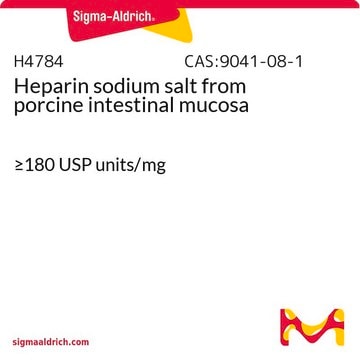D4776
De-N-sulfated heparin sodium salt
Completely de-N-sulfated and approx. 20% N-acetylated
Anmeldenzur Ansicht organisationsspezifischer und vertraglich vereinbarter Preise
Alle Fotos(1)
About This Item
Empfohlene Produkte
Biologische Quelle
heparin from Porcine (mucosa)
Form
solid
Lagertemp.
2-8°C
Suchen Sie nach ähnlichen Produkten? Aufrufen Leitfaden zum Produktvergleich
Anwendung
N-Acetylheparin, derivitized porcine mucosal heparin without anticoagulant properties, may be used to protect cardiac, vascular and neural tissues by inhibiting complement activation and neutrophil infiltration of the damage site.
Angaben zur Herstellung
Prepared from porcine mucosal heparin by a modification of the method of Nagasawa, K. and Inoue, Y., Methods Carb. Chem., 8, 291 (1980).
Lagerklassenschlüssel
11 - Combustible Solids
WGK
WGK 3
Flammpunkt (°F)
Not applicable
Flammpunkt (°C)
Not applicable
Persönliche Schutzausrüstung
Eyeshields, Gloves, type N95 (US)
Hier finden Sie alle aktuellen Versionen:
Besitzen Sie dieses Produkt bereits?
In der Dokumentenbibliothek finden Sie die Dokumentation zu den Produkten, die Sie kürzlich erworben haben.
J L Park et al.
Pharmacology, 58(3), 120-131 (1999-02-02)
The ability of the heparin derivative, N-acetylheparin (NHEP) to protect the heart from regional ischemia/reperfusion injury was examined in vivo. NHEP (2 mg/kg i.v.) or vehicle was administered 2 h before occlusion of the left circumflex coronary (LCX) artery. Open-chest
P C Kouretas et al.
Circulation, 99(8), 1062-1068 (1999-03-02)
Coronary endothelial dysfunction after brief ischemia-reperfusion (IR) remains a clinical problem. We investigated the role of heparin and N-acetylheparin, a nonanticoagulant heparin derivative, in modulating coronary endothelial function after IR injury, with an emphasis on defining the role of the
P C Kouretas et al.
Journal of molecular and cellular cardiology, 30(12), 2669-2682 (1999-02-17)
Heparin, which is widely used clinically, has recently been shown to have specific properties affecting the vascular endothelium. We hypothesized that heparin stimulates endothelial nitric oxide synthase (eNOS) activity by a mechanism independent of its anticoagulant properties and dependent on
Y Hua et al.
Journal of neurosurgery, 92(6), 1016-1022 (2000-06-06)
Brain edema formation following intracerebral hemorrhage (ICH) appears to be partly related to erythrocyte lysis and hemoglobin release. Erythrocyte lysis may be mediated by the complement cascade, which then triggers parenchymal injury. In this study the authors examine whether the
Unser Team von Wissenschaftlern verfügt über Erfahrung in allen Forschungsbereichen einschließlich Life Science, Materialwissenschaften, chemischer Synthese, Chromatographie, Analytik und vielen mehr..
Setzen Sie sich mit dem technischen Dienst in Verbindung.








